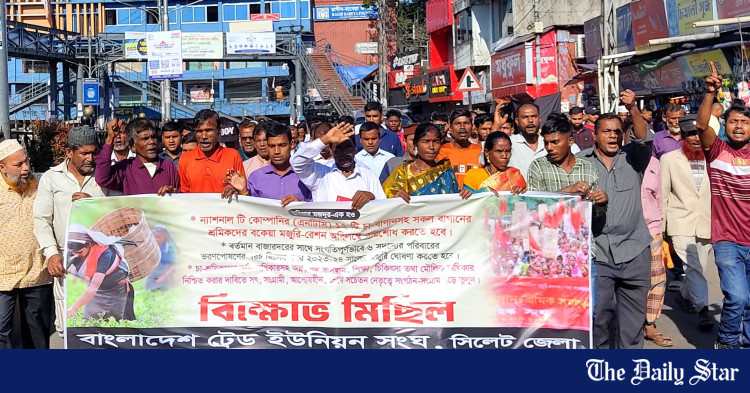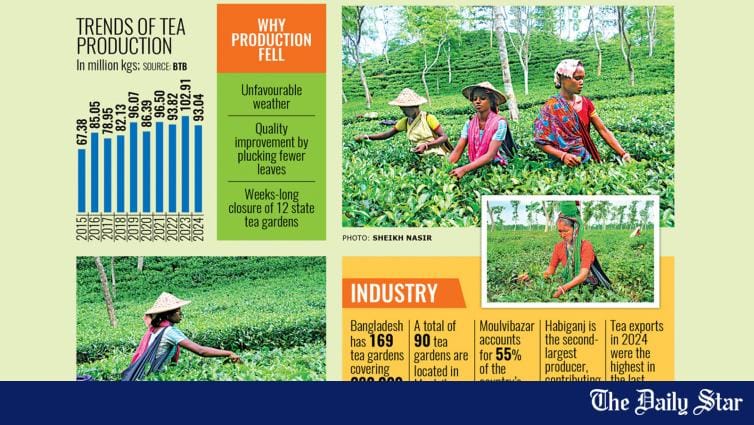Stop the exploitation of tea workers in Bangladesh and fix the industry
Tea workers at Bawani tea garden in Habiganj
View attachment 9261
Women tea workers of Bawani tea garden in Habiganj carrying headloads of green tea leaves, on August 26, 2024. PHOTO: PHILIP GAIN
For nearly seven weeks, more than 12,000 tea workers in 12 tea gardens under the National Tea Company Limited (NTC) have been living in anxiety about the payment of their wages. After they were paid Tk 595 on August 12, which is half of the weekly payment, the payment was halted till September 25, the day they were paid another instalment of the same amount. This is pretty bad for these workers as the Durga Puja festivities are set to begin on October 9. Thankfully, they have not stopped work and production.
However, to keep the management under pressure, the tea workers blocked consignments of made tea out of the garden warehouses. After a negotiation with the management and relevant state agencies, they allowed the release of two consignments from Patrokhola Tea Estate in Moulvibazar's Kamalganj upazila, the largest tea garden of the NTC, and one consignment from each of the 11 other tea gardens on October 1. In exchange, they were paid a week's salary on the same day, confirmed Shipon Chakraborty, panchayat president of Patrokhola. Now the deal is, these workers will release the next consignments from the warehouses when the NTC management clears dues and bonus before Durga Puja.
What we see in the NTC gardens is bad management. NTC is a public limited company formed in 1978 under the Companies Act, 1913. The state holds 51 percent of the shares, and 49 percent are traded in Dhaka and Chattogram stock markets for the general public. Of its 12 tea gardens, seven are located in Moulvibazar, four in Habiganj, and one in Sylhet.
The NTC management, for which the government is responsible, is polluted by politics. The tea gardens, taken over by the government after independence, are located in a good topographic zone, yet they perform very poorly. According to a news report, between July and December of 2023, the company posted a net loss of Tk 26.66 crore. The company's lousy tea garden management is manifested in the look of its gardens: tea plants are sparse and without enough shade trees, among other things. The company's troubles have gotten worse since the sudden political change on August 5, following which the chairman of the company's board of directors, Sheikh Kabir Hossain, reportedly a relative of ousted Prime Minister Sheikh Hasina, has disappeared and the board has almost collapsed.
The tea workers and their lone union, Bangladesh Cha Sramik Union (BCSU), are trying to negotiate with the NTC management. Half-fed or with an empty stomach, these workers have been showing their patience and working regularly in the hope that the management will stay true to its words and clear the full payment of their due wages and bonus before Durga Puja, the biggest festival of Hindus in Bangladesh.
However, NTC now faces many insurmountable challenges. According to a top government official dealing with tea gardens, it has a debt of Tk 380 crore with the Bangladesh Krishi Bank. This year, the company requested for a loan of Tk 150 crore, but the bank sanctioned Tk 86 crore only, which got exhausted by July, said a government official dealing with tea gardens, on condition of anonymity. Per the arrangement of loan repayment, brokers in auction houses transfer the bank's share of sale proceeds directly to its account. The owners get their shares. But the workers are left with no other option but to block the made tea consignments.
While NTC gardens show serious anomalies—which is typical of state-run businesses—there are other private companies and proprietors in the industry that are also plagued with mismanagement and corruption that put their workers in deep crisis. The Imam and Bawani tea estates in Habiganj are a prime example here. The government official disclosed that Imam tea garden was completely shut down along with its factory in October last year after a prolonged crisis. The responsibility for the management of Bawani estate was vested on the deputy director of labour (DDL) in Sreemangal as a result. But the DDL has been having a hard time managing the estate. And the workers of these two gardens are also suffering.
The recent strike called by the Bangladesh Cha Sramik Union (BCSU) has brought the sufferings of our tea workers to the fore. They are demanding a minimum wage of Tk 300 a day to improve their day-to-day lives.
Another example of bad tea garden management is Fultala Tea Garden in Moulvibazar's Juri upazila. Around 1,600 workers in this tea garden have not gotten paid for 12 weeks, as a government official told me. The owner lives in London and has reportedly shut down the garden, though it is still in production to some extent because of the workers. With a bank loan of Tk 50 crore, the owner is in deep trouble, the government official disclosed.
The official further revealed that 79 tea gardens are in terrible shape. These gardens have not made their due contributions to the Provident Fund (PF) for months. Gas and power lines have been cut off in a number of the gardens for not paying the bills. Many of them are selling green tea leaves to other tea gardens for processing as their own factories are not running.
View attachment 9262
Tea workers busy at Bawani tea garden in Habiganj, on August 26, 2024. PHOTO: PHILIP GAIN
Many tea garden owners argue that they are in trouble because the price of tea has gone down while the production cost is rising. Indeed, the government has a policy to expand the tea-growing areas that contribute to increasing production.
Of course, there are examples of good companies that manage their gardens well, take good care of their workers within the existing framework, and make good profits. One such company is Ispahani Tea Limited, which has four gardens. The best among them is Zareen, located in Moulvibazar. While the average production per acre is around 1,600kg, its per acre production is 3,000kg, and the per acre production of all four gardens averages around 2,500kg, according to management. The price that the company gets is good. Almost all houses in the labour lines at Zareen Tea Estate are pucca. The condition of houses in other tea gardens of Ispahani are also much better than in other tea gardens. The workers get better deals with other fringe benefits, the Ispahani management claims.
It is in the best interest of the tea industry in Bangladesh, not to mention the workers, that changes happen for the better. The interim government, which has committed itself to reforms to end discrimination and inequality, should consider giving immediate attention to the tea industry that is in disarray as a whole. The tea garden workers, around 140,000 of them, and their community of around half a million people have been facing severe discrimination for generations, since the beginning of the industry during British colonial times.
First of all, the tea industry, specifically the tea gardens, need proper mapping. Good gardens and bad gardens need to be identified and the reasons must be explained for chalking out recommendations to bring the necessary changes so that none of the tea gardens are beyond scrutiny for mismanagement, corruption, and financial misappropriation. All parties involved with the tea industry must come under scrutiny and be made accountable.
Second, clear attempts must be made to ensure the well-being of tea garden workers, who are deprived of equal treatment and dignity as citizens of Bangladesh. To begin with, a just and respectable wage structure must be fixed for these workers. The former prime minister fixed their daily cash wage at Tk 170 in August 2022, which is certainly not fair. She was allegedly guided by the owners of tea gardens, and her move was political when the minimum wage board was made to fail. Now the time has come to overhaul the tea industry to ensure justice for the tea workers.
Another concern while dealing with their well-being is discrimination in the labour laws and regulations for them, and the owners' routine violation of several sections of the labour legislation, which cannot be justified in any way. While these anomalies have been exposed on various platforms, fresh consultations with tea workers, their trade union and others concerned, will definitely help bring out more details. It is a test for any government to make sure that the state agencies under the labour ministry who are responsible for executing the labour law and rules act honestly.
Tea garden workers, most of whom belong to minority communities, are largely invisible and voiceless. Wage deprivation and social exclusion from the British colonial times have rendered them a weak population, left behind in terms of education and economic progress. Equal opportunities are not enough for them. They deserve some preferential treatment to help them get out of their current condition. The interim government has a big responsibility here.
Philip Gain is researcher and director at the Society for Environment and Human Development (SEHD).








